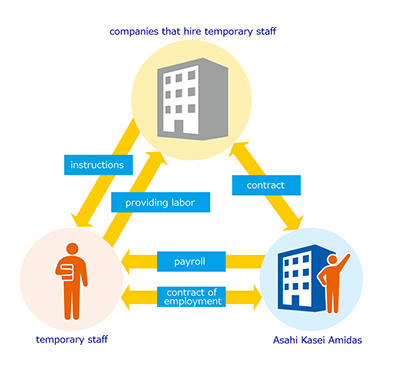100 Stories1987 Creating Jobs, Creating Skills - Amidas
Temporary workers have been attracting a great deal of public attention, as evidenced by the hit TV drama “Haken no Hinkaku - The Pride of the Temp.” Asahi Kasei proactively implemented measures in line with the Equal Employment Opportunity Law and the Act on Stabilization of Employment of Elderly Persons; in 1986, the “Worker Dispatching Act” was put into effect, and in 1987, Asahi Kasei established Amidas.
The U.S.-based Manpower Inc. established a Japanese subsidiary in the 1960s, and in the 1970s, Tempstaff, Pasona, and other major temporary staffing companies established their own Japanese subsidiaries as well.
Amidas provided temporary staffing mainly within the Asahi Kasei Group with the aim of enabling women who had gained experience in the workplace but had left due to marriage or childcare to return to work, as well as providing post-retirement work opportunities for employees with special skills and expertise.
For women, the program provided skill-registered temporary staffing in areas such as document management, OA equipment operation, and trade operations. On the other hand, for male workers, the company dispatched workers mainly to help with the shortage of young workers.
A female employee registered with Amidas at the time said, “Until the late 1980s, it was commonplace for people to leave any company upon marriage, and it would have been a dream come true to change jobs or find new employment as a full-time employee, as is the case today.” Unlike the various large companies to which she was dispatched, Amidas was part of the Asahi Kasei Group, which gave her a sense of security.
She said, “The salary at Amidas was not high compared to other companies, but the work environment was so good that I introduced some of my friends who are not Asahi Kasei alumni to Amidas.”
Amid the bubble economy, Amidas grew significantly, opening branches one after another in Osaka, Yokohama, Miyazaki, and Nagoya between 1988 and 1992. At the start, only women who had retired from Asahi Kasei were eligible for the program, but as it expanded rapidly, the program steadily expanded to include people who had worked outside of Asahi Kasei and people who had no previous clerical experience.
Meanwhile, after the economic bubble burst, the introduction business expanded to include the transfer of middle-aged and older managers of the Asahi Kasei Group to other companies and re-employment, and the number of introductions increased. Since 1994, the company has been cooperating with the Science and Technology Promotion Organization, part of the former Science and Technology Agency, to create a technical information database, and has been commissioned to prepare abstracts and indexes of literature and English-language data.
In 1998, Asahi Kasei also started a consulting business for ISO certification, taking advantage of its abundant technical know-how, assisting in technical translation, and providing support for small and medium-sized businesses.
In 1996, the company changed its name to Asahi Kasei Amidas, and the following year it established the Nobeoka Management Center, which undertakes general personnel and labor affairs, and the business continued to grow rapidly. The office district no longer hires for general positions, but instead conducts general clerical duties such as document preparation, filing and organization, data entry, and answering the phone and greeting visitors. The center also functions as a post-retirement work opportunity, with many former employees continuing to contribute to Asahi Kasei long after their retirement as temporary employees.
Currently, the company is evolving into a flexible dispatch system to make it easier for more people to work, such as dispatching specialists through training-type dispatching and dispatching new graduates to prevent mismatches.
Although temporary staffing has been changing along with the revision of the law, it is predicted that the number of people working utilizing their abilities, characteristics, and expertise will increase, and various dispatch work styles will continue to increase in the future.


